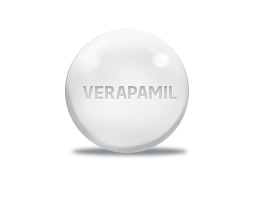 Verapamil
Verapamil

Verapamil is used to treat chest pain, high blood pressure, and certain irregular heart rhythms by relaxing the blood vessels, which allows blood to flow easier through them.
- Availability: In Stock (61 packs)
- Active Ingredient: verapamil
- Analogs of Verapamil
- Isoptin,
- Isoptin Sr,
- Calan
| Package | Per Pill | Savings | Per Pack | Order |
|---|---|---|---|---|
| 60 pills | $0.47 | $0.00 | $27.95 | |
| 90 pills | $0.41 | $5.47 | $41.92 $36.45 | |
| 120 pills | $0.37 | $10.93 | $55.90 $44.97 | |
| 240 pills | $0.33 | $32.80 | $111.80 $79.00 |
| Package | Per Pill | Savings | Per Pack | Order |
|---|---|---|---|---|
| 30 pills | $1.51 | $0.00 | $45.20 | |
| 60 pills | $1.14 | $22.19 | $90.40 $68.21 | |
| 90 pills | $1.01 | $44.37 | $135.60 $91.23 | |
| 120 pills | $0.95 | $66.56 | $180.80 $114.24 | |
| 180 pills | $0.89 | $110.92 | $271.20 $160.28 | |
| 270 pills | $0.85 | $177.48 | $406.80 $229.32 | |
| 360 pills | $0.83 | $244.04 | $542.40 $298.36 |
Verapamil (Verapamil)
General information
Verapamil is called a calcium channel blocker. It works by relaxing blood vessels so blood can flow more easily. Verapamil is used with or without other medications to treat high blood pressure (hypertension). Lowering high blood pressure helps prevent strokes, heart attacks, and kidney problems. It is also used to prevent chest pain (angina). Verapamil is also used to control your heart rate if you have a fast or irregular heartbeat (such as atrial fibrillation). It helps to lower the heart rate, helping you to feel more comfortable. This drug may also be used to treat another type of heart disease (hypertrophic cardiomyopathy).
Directions
Take Verapamil exactly as prescribed by your doctor. Take this medication by mouth with or without food, usually 3 or 4 times daily. Verapamil should be taken at the same times each day to maintain an even level of the medication in your blood. If you are being treated for high blood pressure, keep using this medication even if you feel fine.
Precautions
Before taking Verapamil you should talk with your doctor if you have heart disease, congestive heart failure, sick sinus syndrome, Wolff-Parkinson-White syndrome, Lown-Ganong-Levine syndrome, liver disease, liver failure, cirrhosis, low blood pressure, kidney disease, kidney failure, Duchenne muscular dystrophy, Myasthenia gravis, any allergies. Verapamil can cause side effects that may impair your thinking or reactions. Do not drive or perform tasks that require alertness. Avoid drinking alcohol. Grapefruit and grapefruit juice may interact with verapamil and lead to potentially dangerous effects.
Contraindications
You should not take Verapamil if you are allergic to verapamil hydrochloride, or any of the inactive components of the drug, are pregnant or breastfeeding, or if you have severe left ventricular dysfunction, sick sinus syndrome, third- or second-degree heart block, Wolff-Parkinson-White syndrome or Lown-Ganong-Levine syndrome, heart attack, fluid in your lungs.
Possible side effect
Get emergency medical help if you have fast or slow heartbeats, dizziness, fever, sore throat, headache, peeling, red skin rash, swelling, rapid weight gain, nausea, constipation, stomach pain, low fever, loss of appetite, dark urine, clay-colored stools, redness, itching, jaundice (yellowing of the skin or eyes), hives, difficulty breathing, swelling of your face, lips, tongue. If you notice other effects not listed above, contact your doctor.
Drug interactions
Tell your doctor about all other medications you use, especially: HIV/AIDS medicines (ritonavir, indinavir, atazanavir, delavirdine), heart rhythm medications (quinidine, flecainide, amiodarone), beta-blockers (propranolol, bisoprolol, metoprolol, atenolol), antifungal medications (voriconazole, fluconazole, itraconazole, ketoconazole), antibiotics (telithromycin, erythromycin, clarithromycin), sedatives (midazolam, triazolam), benzodiazepines (diazepam, flurazepam, alprazolam, quazepam), theophylline, rifamycin antibiotics (rifapentine, rifampin, rifabutin), barbiturate medications (butalbital, phenobarbital, pentobarbital), lithium, digoxin, cimetidine, cyclosporine. Interaction between two medications does not always mean that you must stop taking one of them. Tell your doctor about all prescription, over-the-counter, and herbal medications you are taking.
Missed dose
Take the missed dose as soon as possible. Skip the missed dose if it is time for your next scheduled dose. Don't take extra medicine to make up the missed dose.
Overdose
If you think you have overdosed the medicine seek emergency medical help at once. The overdose symptoms are slow heartbeat, fainting, severe dizziness.
Storage
Store the medicine at room temperature between 59-86 degrees F (15-30 degrees C) away from light and moisture. Do not store the drugs in the bathroom. Keep all drugs away from reach of children and pets.
Note
The information presented at the site has a general character. Note please this information cannot be used for self-treatment and self diagnosis. You should consult with your doctor or health care adviser regarding any specific instructions of your condition. The information is reliable, but we concede it could contain mistakes. We are not responsible for any direct, indirect, special or other damage caused by use of this information on the site and also for consequences of self-treatment.
 Over 1,000,000 Happy Customers
Over 1,000,000 Happy Customers
 Low Prices
Low Prices
 Fast Delivery
Fast Delivery
